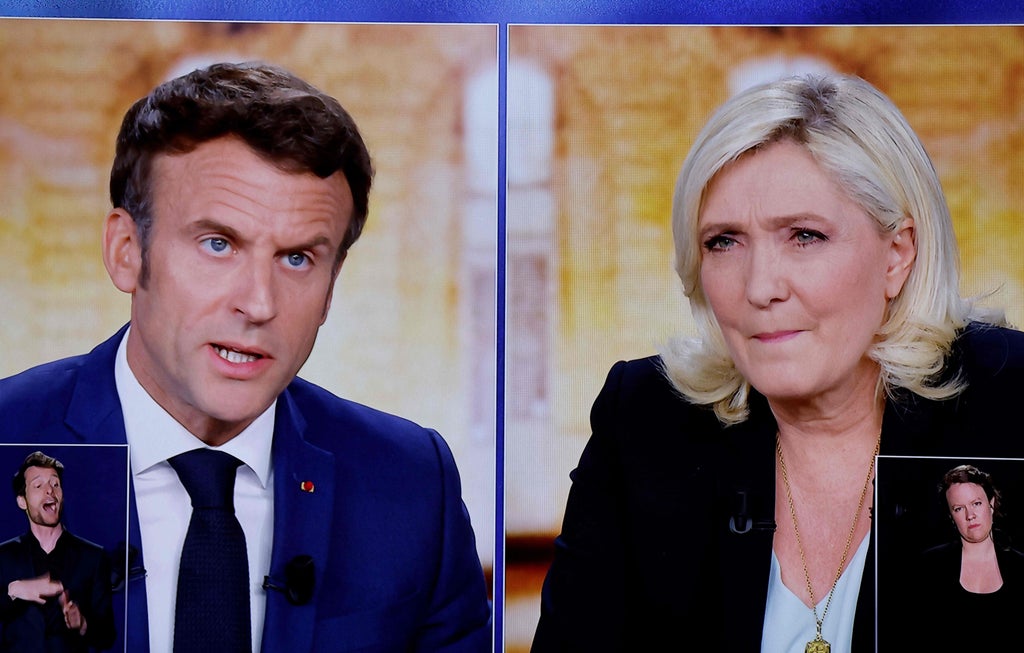
French presidential candidates Emmanuel Macron and Marine Le Pen were back on the road Thursday for the final two days of campaigning following their heated TV debate.
Mr Macron, who represents the La Republique En Marche! party met voters in the Paris suburb of Seine-Saint-Denis and Ms Le Pen, of the National Rally party was in the northern town of Arras .
France’s electorate goes to the polls on Sunday 24 April to decide who will be the next president, following the elimination of 10 other candidates in the first on 10 April, including socialist Jean-Luc Melenchon, far-right contender Eric Zemmour and Paris mayor Anne Hidalgo.
An exit poll is expected to be published at 7pm GMT on Sunday with the official final results announced the following day.
Mr Macron secured 27.8 per cent of the vote 11 days ago to Ms Le Pen’s 23.1 per cent and is currently leading in opinion polls by as much as 56 per cent to 44 per cent, although Sunday’s ballot is expected to prove a close contest nonetheless.
The president is seeking to appeal to disaffected leftists and present a pro-European case for unity against Russia’s war in Ukraine while Ms Le Pen, presenting a more moderate front than she did five years ago, is hoping to position herself as a candidate for change.
If Mr Macron wins, as the polls currently forecast, he could face a difficult second term, with little to no grace period and voters of all stripes likely to take to the streets again over his plan to press ahead with pro-business reforms.
If Ms Le Pen wins, radical changes to France’s domestic and international policies would be expected and street protests could commence immediately.
During Wednesday night’s debate, the pair sparred over the former’s five-year record in the Elysee and Ms Le Pen’s history of far-right views and past expressions of admiration for Vladimir Putin, which saw her having to scrap leaflets earlier in the campaign that featured a photograph of herself alongside the Russian leader.
On the offensive for most of the debate, the incumbent’s most piercing line of attack came when he alluded to a loan Ms Le Pen’s campaign had received in 2017 contracted through a Russian bank.
“You talk about your banker when you talk about Russia, that’s the problem,” Mr Macron told his opponent. “You depend on Russian power, you depend on Mr Putin.”
On the cost of living, considered the most important issue of this election, the president forced Ms Le Pen onto the defensive when he asked her why she had voted against his plans to cap electricity prices if she wanted to help hard-up workers.
However, Mr Macron’s approach arguably only encouraged the perception of him as haughty and aloof, notably when he interrupted his rival to tell her to “stop mixing things up” and when he observed, patronisingly: “Mrs Le Pen is much more disciplined than five years ago.”
“Mr Macron, stop lecturing me,” she responded to that jibe, otherwise adopting a much more courteous and softer tone than in 2017, even going so far as to applaud Mr Macron’s diplomatic efforts to prevent war in Ukraine, which saw him visit the Kremlin in person in February as part of a last-ditch attempt to pull Mr Putin back from the brink.
Ms Le Pen did deliver at least one memorable punchline during the night, which may resonate with left-wing and younger voters who think Mr Macron has not done enough to combat the climate crisis, despite his slogan: “Make our planet great again”.
“I am not a climate sceptic, but you’re a bit of a climate hypocrite,” she sneered, just in time for Earth Day.
Approximately 59 per cent of viewers of the debate said afterwards that they found the combative Mr Macron to be arrogant but also more convincing and fit to be president, according to an Elabe poll for BFM TV.
Ms Le Pen, who placed her emphasis on expressing empathy with the French citizens she said had “suffered” since her opponent was elected, was judged to be slightly more in tune with their concerns but her anti-immigration rhetoric was still considered a cause for concern by the majority, the survey indicated.
Additional reporting by agencies







